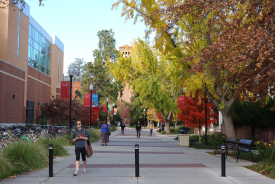Julian Rubinfien, a junior student at Stuyvesant High School, studied a way to measure genes in space to better understand human aging brining closer to the discovery of the fountain of youth. Soon, the National Aeronautics and Space Administration (NASA) will send his intellectual property to the International Space Station (ISS) for further tests.
Apparently, the blast-off was scheduled on Monday but a problem occurred with one of the rocket's boosters. Nevertheless, the project is still a go and will be rescheduled as soon as possible. It is set to happen at the famous Kennedy Space Center in Florida.
Rubinfien, 16, competed in the national "Genes in Space" contest held last June. According to the New York Daily News, his study ranked second against 300 other submissions. The first place went to a Bedford student, whose research brought zebrafish DNA to space for gene replication.
Jessica Quenzer, Rubinfien's biology teacher, assisted him from conceptualization up until the presentation of the project. She will also accompany her student on the launching date. Quenzer acknowledged Rubinfien's curiosity and ambition that led him to this success.
To be specific, NASA will bring DNA strands to the ISS, where they will be mutated and then returned to Earth. This move will help scientists understand the premature aging experienced by astronauts when traveling to space. Contest organizer Sebastian Kraves noted that aging is one of the things they worry about when going out to orbit. A decreased bone mass, slower cardiovascular functioning, and weaker immune system are just a few of the symptoms.
Earlier this year, NASA launched a study featuring Keller identical twins, Scott the astronaut and Mark the earth dweller. Per Outer Places, Dr. Susan Bailey's findings reveal that Scott's telomeres grew in space but shortened again when he returned to the planet. Simply put, there is a possibility that humans could move to a space station and have a longer life.
Telomeres are found at the end of chromosomes. Its length can deter the rate of aging as well as the development of fatal diseases. People with short telomeres are more susceptible to weight gain, heart attack, and cancer. At the end of the day, living in space can still pose serious health risks like myocardial dysfunction, muscle atrophy, and osteopenia.
© 2025 University Herald, All rights reserved. Do not reproduce without permission.








